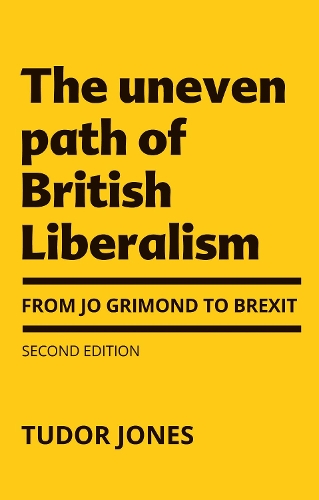
The Uneven Path of British Liberalism: From Jo Grimond to Brexit,
(Hardback)
Publishing Details
The Uneven Path of British Liberalism: From Jo Grimond to Brexit,
By (Author) Tudor Jones
Manchester University Press
Manchester University Press
13th September 2019
United Kingdom
Classifications
Physical Properties
Hardback
464
Width 138mm, Height 216mm
Description
This book charts the development of political thought within the British Liberal Party and its successor, the Liberal Democrats. Beginning with Jo Grimond's rise to the leadership in 1956, it follows the Liberal resurgence in the second half of the twentieth century through to the major setbacks of the 2015 general election and the 2016 referendum on UK membership of the European Union. Drawing on interviews with leading politicians and political thinkers, the book examines Liberal ideas against the background of key historical events and controversies, including the period of coalition government with the Conservatives. -- .
Reviews
'Well-researched, thorough and balanced.'
Sir Vince Cable, Leader of the Liberal Democrats
'Tudor Jones has written a meticulously detailed and scholarly account of the revival of the Liberal Party since the dog days of the 1950s, and of the tribulations of the Liberal Democrats since the merger with the SDP in the 1980s. The uneven path of British Liberalism will prove the standard work on the subject, and it is of particular relevance at a time when the Liberal Democrats seem on the brink of a revival. It is a contribution of great importance to recent political history.'
Vernon Bogdanor, Professor of Government, King's College London
Since the mid-1950s, when observers first discerned a revival in its fortunes, the electoral history of the British Liberal Party and its successor, the Liberal Democrats, has been characterised by a bewildering series of upturns and reversals. This uneven path has been accompanied by an ongoing internal debate partisans might reject the suggestion of a dispute over the partys underlying philosophy and purpose. Much of this relates to Liberalisms uneasy coalition of social and economic traditions and the extent to which they can be combined within the same political movement. Showing an impressive knowledge and understanding of the relevant literature, Tudor Jones expertly leads the reader through Liberalisms ideological history over the last sixty years. His work is timely. With the Liberal Democrats again reclaiming a significant role in British politics, this book is one which students and practitioners of Liberalism will want to read.
David Dutton, Ramsay Muir Emeritus Professor of Modern History, University of Liverpool
'Jones deftly interleaves a well-informed description of the party's internal philosophical debates with a clear account of its political fortunes, both good and not so good, between 1945 and 2017. The new chapters on the coalition and its immediate aftermath are notably fair and balanced, providing a valuable resource not only for historians but also for journalists and indeed anyone eager to get beyond partisan views of that still controversial period.'
David Howarth, Professor of Law and Public Policy, University of Cambridge and MP for Cambridge from 200510
Author Bio
Tudor Jones is Honorary Research Fellow in the History of Political Thought at Coventry University
